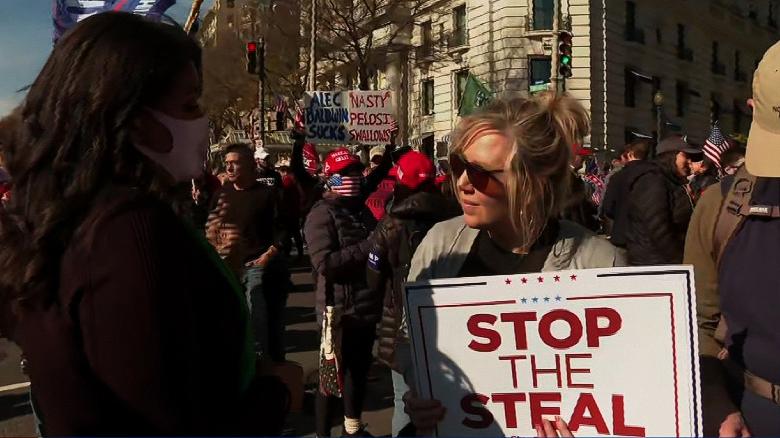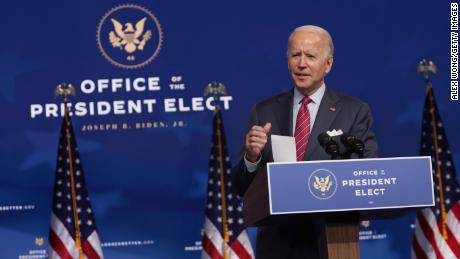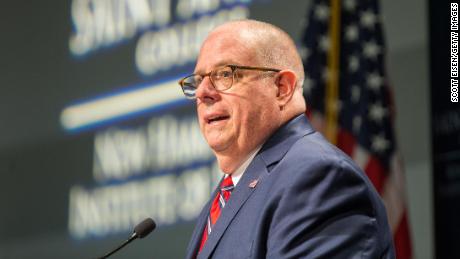(CNN)The Supreme Court's rejection last week of the lawsuit from Texas and 18 other Republican-led states effectively ended the legal efforts by President Donald Trump and his allies to overturn his election defeat.
But the case likely marks the start of a new round of Republican efforts to challenge the basic rules of American democracy by limiting access to the voting booth and potentially again seeking to undo elections they lose. And an assertion buried deep in Texas' final filing to the Supreme Court helps explain why.
In that legal brief, Texas raised a specter common to all of the challenges from Trump and his allies against the results: the unsupported claim that the election was being stolen through massive voter fraud in large cities with substantial populations of African Americans and other minorities. If the Supreme Court refused to overturn the results in the four states that the lawsuit targeted, Texas argued, it will encourage "further lawlessness and ... drive honest voters from the polls: why should anyone vote if a few urban centers will manufacture an unlawful and insuperable vote margin?"
That charge of systemic urban cheating encapsulates the widespread fear among Republicans that they are losing control of the country to a racially and religiously diverse Democratic coalition based primarily in the nation's largest cities.
That was the same anxiety that prompted last week's musings about conservative secession by conservative talk radio host Rush Limbaugh, who noted: "I see more and more people asking what in the world do we have in common with the people who live in, say, New York." And it's the same fear that Trump prodded during his recent campaign rally in Valdosta, Georgia (population 56,457), when he presented his charge that Democrats are trying to "steal" the election as the culmination of his larger message that elites, minorities and other groups in the Democratic coalition are trying to "steal" the country from his mostly White and non-urban base.
"This is our country," Trump insisted to his preponderantly White audience. "And you know this, and you see it, but they are trying to take it from us through rigging, fraud, deception and deceit."
Trump's connection of his near-term fraud claims with his familiar warnings that long-term demographic and cultural change threatens his supporters helps explain why such a staggeringly large percentage of Republican voters -- up to about three-fourths in some recent surveys -- have accepted his new "urban myth" that the election was stolen, even though state and federal courts across the country have uniformly dismissed the President's unsupported "evidence."
For Republican voters who have responded for years to claims from Trump and leading voices in the conservative media environment that a shadowy alliance of elites and minorities centered in cities is trying to hijack their heritage and transform the country into something unrecognizable, it's a short step to believing that the same groups are literally stealing the results of elections.
"Trump is basically leveraging what has been a half of a century of cultural conditioning among Republicans about who is and who isn't American," says Robert P. Jones, founder and CEO of the nonpartisan Public Religion Research Institute, which studies Americans' cultural attitudes. "I think it is naive to think this is going to go away anytime soon, because it's been built into a worldview."
New attempts to curb voting access
The stunning receptivity of GOP voters to those arguments shows why groundless charges of urban-based voter fraud are likely to remain central to the Republican message for years -- and more immediately to become the justification for new efforts to restrict access to voting.
For the past decade, Republican-controlled states have steadily imposed restrictions on voting such as strict identification laws, particularly since the Supreme Court severely retrenched the Voting Rights Act in its 2013 Shelby County decision. But Trump's fraud claims, even as they've been dismissed in courts across the country, are pressuring Republicans to launch a new wave of these efforts.
In Georgia, the Republican majority in the state Senate has already announced that in the next legislative session it will work to ban drop boxes and repeal the state's law allowing any voter to cast a mail ballot. After Trump's unrelenting criticism of Georgia Republican Secretary of State Brad Raffensperger, the Republican state House speaker, meanwhile, says he will pursue a constitutional amendment to transform that office, which administers the state's elections, from an elected position chosen by voters to one appointed by the Legislature. In Texas, where Democrats fell short in all of the key races but nonetheless substantially increased their share of the vote from 2016, state Republicans have already announced a raft of proposals to tighten access to voting.
Vanita Gupta, president of the Leadership Conference on Civil and Human Rights, says these may be just the forward edge for a new round of measures in Republican-controlled states to make it more difficult to vote. "We are anticipating a slew of laws at the state level being proposed to further suppress the vote or restrict the right to vote," says Gupta, who led the Justice Department's civil rights division under Barack Obama.
All of these measures are grounded in the claim that the big racially diverse cities at the core of the modern Democratic coalition are engaged in systematic fraud. Trump has focused almost all of his public allegations of fraud on a handful of large, racially diverse Democratic-leaning cities, particularly Philadelphia, Detroit, Milwaukee and Atlanta. The legal briefs last week from Texas and the GOP states that supported it concentrated almost entirely on the same cities.
In its initial filing to the court, Texas even sweepingly described such places as "urban centers with histories of electoral fraud." Rudy Giuliani, the President's personal attorney and the face of his long-shot legal challenges, has issued similarly blanket denunciations of Philadelphia and Detroit as endemically corrupt, and recently he insisted that a video of mostly Black poll workers in Fulton County (Atlanta) allegedly revealed that they were "passing around USB ports like they were vials of heroin or cocaine." In Phoenix, Giuliani claimed, without any proof, that massive numbers of undocumented immigrants had voted.
The focus from Trump and his allies on big racially diverse cities -- especially with such racially inflammatory language as Giuliani's -- is especially revealing because Trump actually faced a steeper decline on Election Day in well-educated often heavily White suburbs, where he hasn't alleged fraud.
In the election, Trump's position in the largest cities was complex. With fewer voters choosing third party options, he improved his share of the vote relative to 2016 in many large urban centers, including several of those he's accused of fraud. Overall, he won about 33% of the vote in the largest city centers, compared with just over 31% in 2016, according to the classification system the rural-focused website The Daily Yonder uses to categorize US counties on an urban-to-rural scale.
Still, because so many more people turned out to vote in 2020 than in 2016, Trump, despite winning a higher percentage of the vote, emerged from those big counties facing a larger net deficit in total votes: This time he lost them by 13.2 million votes, compared with 11.1 million in 2016, according to figures provided by the Daily Yonder writer Bill Bishop.
But if Trump's position was ambivalent in the largest cities, in the inner suburbs of those places his decline was unambiguous. According to Daily Yonder tabulations provided by Bishop, Trump this year lost the inner suburbs of the largest cities by a much larger margin in both percentage terms (nearly a 10-point deficit, compared with 6 points in 2016) and votes (a 4.4 million deficit, compared with 2.2 million last time).
Yet Trump and his allies are alleging massive fraud in Detroit, not nearby Oakland County; in Philadelphia, not in neighboring Montgomery and Delaware counties; in Atlanta, not Cobb and Gwinnett, the giant suburbs to its north.
Racist signaling
To many observers, the fact that Trump is exempting such well-educated, affluent and Whiter places from his allegations of fraud reveals how his charges against the big urban centers rest on a foundation of racist signaling.
"They are directly attacking Black voters and voters of color that live in these cities," says Gupta. "And I think the comparison of cities versus neighboring counties demonstrates the degree to which this is in a lot of ways reminiscent of Jim Crow voting exclusions, where they are seeking after the fact to undermine or discount Black voters."
One judge on the Wisconsin Supreme Court made the same point over the weekend, when Trump attorneys challenged the ballots in Milwaukee and Dane (Madison) counties, the state's two largest urban centers. Judge Jill Karofsky told Trump lawyers, "In your lawsuit what you have done here is target the vote of 250,000 people ŌĆö not statewide, but in two of our 72 counties that have diverse populations, because they are urban, and because they vote Democratic. This lawsuit ... smacks of racism."
Yet if these broad charges of systemic urban fraud have not persuaded any judges in Trump's post-election lawsuits, they are clearly resonating with many GOP voters. Despite Trump's almost unbroken streak of legal defeats, polling has shown that a remarkable share of his supporters believe the election was stolen.
Jones, like other analysts, sees the receptivity to those claims as a measure of how much of the Republican coalition -- which remains centered on Whites who identify as Christians, particularly outside of major metropolitan centers -- fears being marginalized in an America growing more racially and religiously diverse as well as more urbanized. In the latest Public Religion Research Institute national poll, a larger share of Republicans said that Christians (62%) and Whites (57%) faced "a lot" of discrimination than said the same about Blacks (52%) or Hispanics (45%).
Trump incessantly encourages those sentiments by portraying his voters as under siege from an assortment of malevolent forces: contemptuous elites, dangerous immigrants and violent racial-justice protesters. Trump crystallized that argument in his Valdosta speech when he declared, "We're all victims. Everybody here, all these thousands of people here tonight, they're all victims, every one of you."
Trump's claim of systemic voter fraud snaps onto that larger message as easily as one Lego block onto another. As Jones notes, Trump's signature promise to "Make America Great Again" already evokes "turning back the clock, restoring the country back to a time when White Christians and White working-class people did have more power and were, demographically speaking, a larger proportion of the country." Having established those as the groups who are unfairly being pushed aside, Jones continues, "it makes a lot of sense that he can then just say, 'I'm with you and you're with me, and these people who don't look like us are stealing the country and stealing the election.' "
This claim, as Jones notes, extends the core Trump argument of redefining "who is and isn't American." In the President's construct, Republicans represent the "real America" and Democrats constitute an un-American force that would rip out the nation's traditions to advance a "left-wing cultural revolution," as Trump put it in his combative Mount Rushmore speech last summer. Many other Republicans adopted similar arguments in their 2020 campaigns, and that contention remains the centerpiece of the GOP campaign in the two Georgia runoffs next month that will decide control of the US Senate: One conservative group has even titled its bus caravan for the candidates the "Save America" tour.
A Republican Party defining itself as the last line of defense between genuine American traditions and Democrats who would transform the country into something dangerously different is a party for which adherence to the rules of "small d" democracy may be a luxury, not a necessity. If the stakes in each election are really that apocalyptic, the GOP may be increasingly drawn to using any means necessary to hold off an urban-based, diverse Democratic coalition that many Republicans have convinced themselves is stealing elections to advance its larger project of stealing what Trump calls "our country."
Trump's maneuvers failed legally, but, in large measure, they succeeded politically by enlisting a stunning number of Republican office holders -- as well as GOP voters -- behind his effort to overturn the election. This is unlikely to be the last time that much of the GOP decides the basic rules of democracy are dispensable -- if that's what it takes to resist the fundamental demographic, cultural and economic changes, the metropolitan-based reconfiguration of American life, that so many Republican voters fear will eclipse them.


























